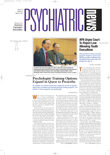Repetitive transcranial magnetic stimulation (rTMS) is a rapidly developing technique for the investigation of brain function and the treatment of neurological and psychiatric disorders. In the past decade, for instance, it has gained increasing attention as a promising new therapeutic modality for treating treatment-resistant depression (Psychiatric News, May 7).
In light of the growing interest in using rTMS in a variety of experimental and therapeutic settings, the International Society for Transcranial Stimulation drew up a consensus statement to assist the field in developing guidelines for its safe application. Whether the intended use is experimental or therapeutic, certain principles regarding the safety of rTMS apply, the society believes.
The statement is not aimed at guiding the therapeutic use of rTMS or its applications in research, but rather is meant to apply broadly to rTMS use.
The statement is titled “Managing the Risks of Repetitive Transcranial Stimulation” and was published in the July 2003 CNS Spectrums.
At its June meeting, the APA Board approved the consensus statement as a resource document. A resource document is a collection of information, data, and reviews of the literature developed by APA components and staff that are seen as useful and needed by APA and members and by the field. The findings, opinions, and conclusions of the statement do not necessarily represent the views of the officers, trustees, or all APA members.
The consensus statement defines rTMS specifically as the administration of a series of magnetic stimuli to the brain for the purpose of altering brain function and specifies that rTMS is an experimental medical intervention under investigation as a potential treatment for neurological and psychiatric disorders, indicates that epileptic seizure is a significant risk of rTMS, and provides principles for safe administration of rTMS.
To reduce risks associated with the use of rTMS, the consensus statement recommends the following:
•
rTMS should be administered only by or under orders of a licensed physician.
•
Those who administer the procedure must be trained as “first responders.”
•
The procedure must be administered in a medical setting.
•
The dosage must be limited by published safety guidelines.
•
Administration must be in compliance with regulations issued by regulators and professional medical organizations.
The resource document will soon be posted on APA's Web site at<www.psych.org/public_info/libr_publ/resource.cfm>.▪
